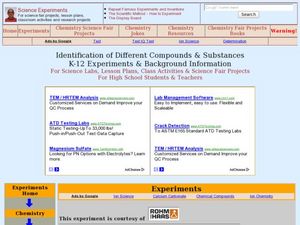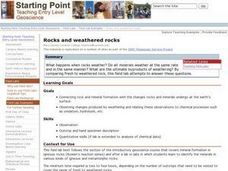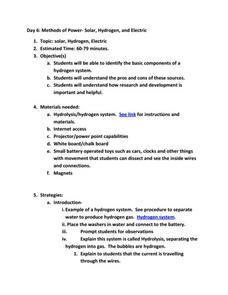Curated OER
Predicting the pH of Salt Solutions
A single page provides you with lecture notes for your lesson plan on hydrolysis. Introduce your chemistry class to Bronsted-Lowry theory by explaining the hydrolysis of acidic cations and basic anions. Show them how the resulting pH can...
Curated OER
Hydrolysis
In this hydrolysis worksheet, students write dissociation equations for the given salts and determine if the salt is acidic, basic, or neutral. This worksheet has 6 fill in the blank questions and 4 problems to solve.
Curated OER
Identification of Different Compounds and Substances
Students conduct a series of tests to identify unknown compounds. In this chemistry lesson, students compare the physical and chemical properties of substances. They collect data and formulate a conclusion.
Curated OER
Rocks and weathered rocks
Students connect rock and mineral formation with the changes rocks and minerals undergo at the earth's surface. They observe changes produced by weathering and relating these observations to chemical processes such as oxidation,...
University of Georgia
Antacid and Uncle Heartburn
Household materials can be used for more than cleaning! In this collaborative experiment, emerging chemists use products such as vinegar and liquid antacid to explore chemical reactions that commonly occur in the human body.
Curated OER
Intrinsic Viscosity
Students treat a high molecular weight polyvinyl alcohol polymer with potassium periodate. They measure the viscosity of polyvinyl alcohols.
Virginia Department of Education
Soap, Slime, and Creative Chromatography
Do you think chromatography paper suffers from separation anxiety? Young chemists make soap, slime, silly putty, and experiment with chromatography in this lesson. The material includes clear instructions for each experiment along with...
Curated OER
The Identification of Bacteria
High schoolers are given a two week period to put to use the knowledge they have gained while studying bacteria. As a culminating activity, students each receive three unknown bacteria to identify.
Curated OER
The Role of Enzymes
Young scholars explore the role of enzymes in chemical reactions. In this enzymes lesson plan, students use hydrogen peroxide and manganese dioxide to observe a chemical reaction. Young scholars observe the rates of reactions of chalk,...
Curated OER
Non-nutrients: Fiber and Water
Students will identify the sources and function of carbohydrates and fiber and apply appropriate food preparation techniques.
Curated OER
Esters as Food Flavorings
High schoolers produce esters in the laboratory by combining different carboxylic acids with different alcohol. In this esterification lesson plan, students experiment with 3 carboxylic acids and 3 alcohols to produce 3 esters with fruit...
Curated OER
Methods of Power- Solar, Hydrogen, and Electric
Learners examine solar, hydrogen, electric power. In this research based lesson, students will do simple investigations, view videos, discuss, and research how these three types of energy are used for power. They illustrate a...
Curated OER
Reaction Rates and Catalysis in Ethanol Production
Students investigate alternative catalysts for the degradation of hydrogen peroxide. In this fermentation instructional activity students complete an activity that breaks down cellulose into sugar.
Curated OER
Non-Nutrients: Fiber and Water
Students discuss how much fiber and water a person needs each day. They use beans soaked in water to show the benefits of water to the human body. They also learn the health benefits to eating healthy.
Curated OER
Enzyme Lab
Young scholars examine the effects of specific enzymes on samples of liver tissue, muscle tissue (chicken), apples, and potatoes.
Curated OER
COMPARISON OF FOUR-, SIX-, AND EIGHT-bp CUTS IN CALF THYMUS DNA
Students use this laboratory exercise, restriction enzymes to recognize a four-, six-, and eight-nucleotide sequence. Assuming that the four component nucleotides (A, C, T, G) are distributed randomly within a DNA molecule, then any...
Curated OER
Lactose & Lactase
Students examine the characteristics of lactose and lactase. For this enzyme lesson students study the lactose in milk and its rate of dissolution.
Curated OER
Comparison of Four-, Six-, And Eight-bp Cuts in Calf Thymus Dna
Young scholars investigate the use of restriction enzymes to recognize a four-, six-, and eight-nucleotide sequence. They utilize restrictive endonucleases to cut Thymus DNA and compare results by viewing the DNA fragments on Agarose Gel...
Curated OER
A Self Directed Inquiry into the Identification of Unknowns
Learners gain experience in designing an experiment and use logic in selecting specific tests for unknowns. Students recognize the use of spreadsheets in helping one to make clear comparisons.
Other popular searches
- Dehydration Hydrolysis
- Salt Hydrolysis
- Hydrolysis and Condensation
- Atp Hydrolysis
- Water Hydrolysis
- Hydrolysis Reactions
- Hydrolysis by Enzymes
- Salt Hydrolysis Calculations


















